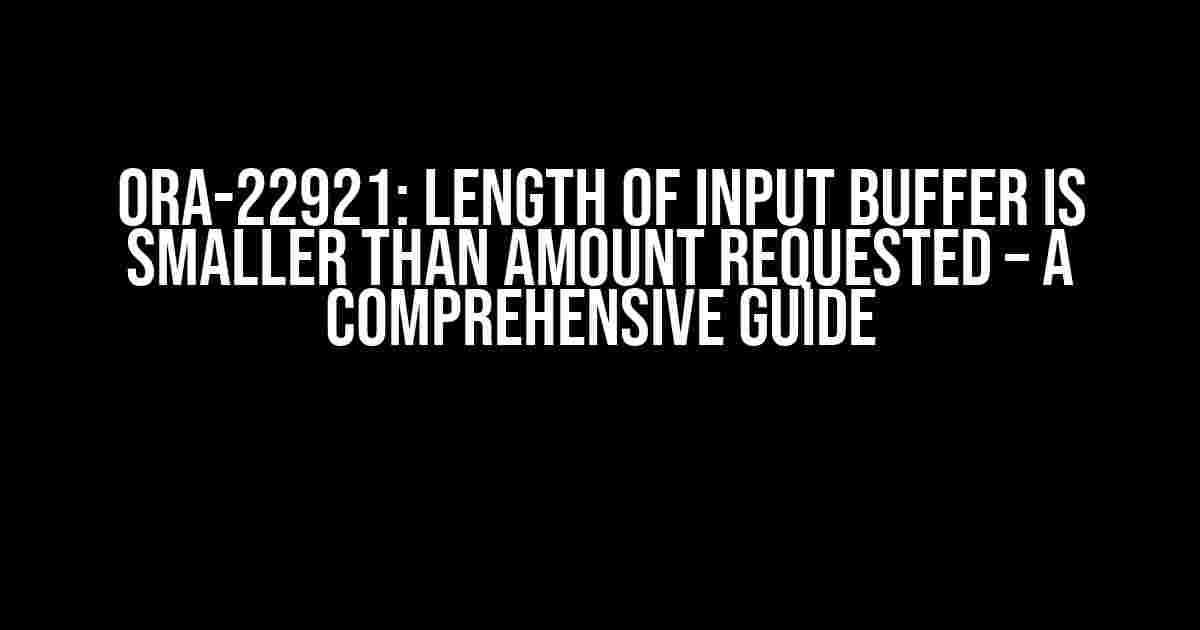Are you tired of encountering the frustrating ORA-22921 error message while working with Oracle databases? Do you struggle to understand the cause of this error and how to resolve it? Fear not, dear reader, for this article is here to provide you with a comprehensive guide to understanding and fixing the ORA-22921 error.
What is ORA-22921?
The ORA-22921 error occurs when the length of the input buffer is smaller than the amount requested. This error typically arises when you are trying to insert or update data in an Oracle database using a programming language such as Java, Python, or C#. The error message is often accompanied by a description that reads “Length of input buffer is smaller than amount requested”.
Causes of ORA-22921
Before we dive into the solution, it’s essential to understand the root causes of the ORA-22921 error. Here are some common reasons why you may encounter this error:
-
Inadequate Buffer Size: The most common cause of the ORA-22921 error is an inadequate buffer size. This occurs when the input buffer is too small to hold the data being inserted or updated.
-
Incorrect Data Type: Using an incorrect data type for the input buffer can also lead to the ORA-22921 error. For example, trying to insert a string into a numeric field can cause this error.
-
Malformed SQL Statement: A malformed SQL statement can also trigger the ORA-22921 error. This includes syntax errors, incorrect table or column names, or invalid SQL keywords.
-
Insufficient Privileges: Lack of sufficient privileges to perform the desired operation can also result in the ORA-22921 error.
How to Resolve ORA-22921
Now that we’ve discussed the causes of the ORA-22921 error, let’s move on to the solutions. Here are some step-by-step instructions to help you resolve this error:
Increase Buffer Size
The simplest solution to the ORA-22921 error is to increase the buffer size. You can do this by:
-
ALTER SESSION SET BUFFER_SIZE = <new_buffer_size>; -
Replace
<new_buffer_size>with the desired buffer size.
For example:
ALTER SESSION SET BUFFER_SIZE = 32767;Check Data Type
Ensure that the data type of the input buffer matches the data type of the column you’re trying to insert or update. You can use the DESCRIBE command to check the data type of the column:
DESCRIBE <table_name>;Replace <table_name> with the name of the table.
Validate SQL Statement
Validate your SQL statement to ensure it’s correct and well-formed. You can use the EXPLAIN PLAN command to check the syntax of your SQL statement:
EXPLAIN PLAN FOR <sql_statement>;Replace <sql_statement> with your SQL statement.
Check Privileges
Ensure that you have sufficient privileges to perform the desired operation. You can use the SYSTEM_PRIVILEGES view to check your privileges:
SELECT * FROM SYSTEM_PRIVILEGES WHERE USERNAME = '<username>';Replace <username> with your username.
ORA-22921 in Different Programming Languages
The ORA-22921 error can occur in various programming languages, including Java, Python, and C#. Here’s how to resolve this error in each of these languages:
Java
In Java, you can resolve the ORA-22921 error by using the setBufferSize() method:
oracle.sql.ArrayDescriptor ad = new oracle.sql.ArrayDescriptor("MY_ARRAY_TYPE", conn);
ad.setBufferSize(32767);Python
In Python, you can resolve the ORA-22921 error by using the cursor.arraysize attribute:
import cx_Oracle
conn = cx_Oracle.connect("username/password@host:port/service_name")
cursor = conn.cursor()
cursor.arraysize = 32767C#
In C#, you can resolve the ORA-22921 error by using the OracleCommand.ArrayBindSize property:
using Oracle.ManagedDataAccess.Client;
OracleConnection conn = new OracleConnection("username/password@host:port/service_name");
OracleCommand cmd = new OracleCommand("INSERT INTO MY_TABLE VALUES (:my_array)", conn);
cmd.ArrayBindSize = 32767;Conclusion
In conclusion, the ORA-22921 error is a common issue that can be resolved by increasing the buffer size, checking the data type, validating the SQL statement, and ensuring sufficient privileges. By following the steps outlined in this article, you should be able to resolve the ORA-22921 error and continue working with your Oracle database.
Table of Contents
| Section | Description |
|---|---|
| What is ORA-22921? | Definition and explanation of the ORA-22921 error |
| Causes of ORA-22921 | Common causes of the ORA-22921 error |
| How to Resolve ORA-22921 | Step-by-step instructions to resolve the ORA-22921 error |
| ORA-22921 in Different Programming Languages | Resolving the ORA-22921 error in Java, Python, and C# |
| Conclusion | Summary of the article and final thoughts |
We hope this article has been helpful in resolving the ORA-22921 error. If you have any further questions or concerns, please don’t hesitate to ask.
Frequently Asked Question
Get the inside scoop on solving the pesky “ORA-22921: length of input buffer is smaller than amount requested” error!
What does the “ORA-22921: length of input buffer is smaller than amount requested” error mean?
This error occurs when the input buffer size is too small to hold the data being requested. Think of it like trying to pour a gallon of milk into a pint-sized jug – it just won’t fit! To fix this, simply increase the input buffer size to match the amount of data being requested.
How do I increase the input buffer size?
Easy peasy! You can increase the input buffer size by modifying the corresponding parameter in your database setup. For example, in Oracle, you can alter the DBMS_LOB package to increase the buffer size. Consult your database documentation for specific instructions.
What are some common scenarios that trigger this error?
This error often rears its head when working with large datasets, like LOBs (Large OBjects) or BLOBs (Binary Large OBjects). It can also occur when using certain database functions or procedures that require more buffer space than allocated. Be on the lookout for these scenarios, and adjust your buffer sizes accordingly!
Can I avoid this error by using a different data type?
While it’s possible to avoid this error by using a different data type, it’s not always the best solution. Sometimes, using a different data type might compromise data integrity or impact performance. Instead, focus on adjusting the buffer size to match your data requirements. If you do decide to change data types, make sure you understand the implications and test thoroughly!
What are some best practices to prevent this error in the future?
To avoid this error in the future, make it a habit to monitor your buffer sizes and adjust them as needed. Additionally, test your code with varying data sizes to ensure it can handle different scenarios. Finally, stay up-to-date with database documentation and patches to ensure you’re aware of any changes that might affect buffer sizes.


